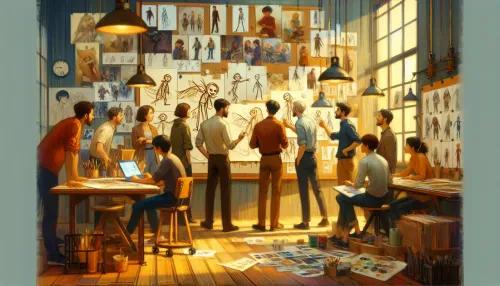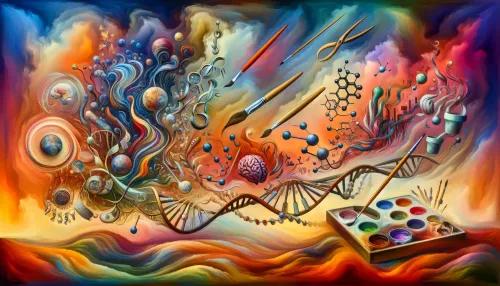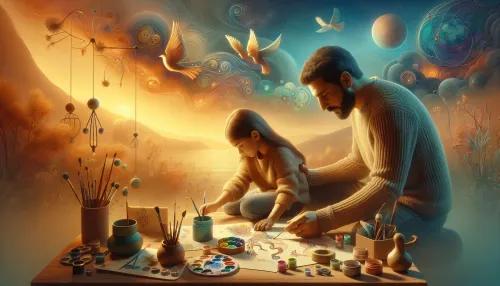
The Spectrum on Screen: Documentaries Unveiling the Truths and Myths About Autism

Humanizing the Autism Experience Through Documentary Storytelling
Autism, a complex neurological condition, has often been shrouded in myths and misconceptions. Documentary storytelling has emerged as a powerful medium in offering authentic insights into the lives of individuals on the autism spectrum, humanizing their experiences, and challenging prevailing stereotypes. Through emotional narratives and compelling visuals, documentaries have provided a platform to educate audiences about the diverse realities of autism, ultimately paving the way for dialogue and understanding.
Portraying the Everyday Lives of Individuals with Autism
Documentaries focusing on autism often capture the day-to-day lives of individuals on the spectrum, shedding light on their unique challenges, triumphs, and perspectives. These films authentically showcase the experiences of people with autism, offering viewers an opportunity to glimpse into their world. The "HorizonsMind Blog" audience can gain valuable insights through these documentaries, understanding the diverse ways in which autism can manifest and its impact on individuals and their families.
One such impactful documentary is "Life, Animated," directed by Roger Ross Williams. The film follows Owen Suskind, a young man with autism, as he uses his deep connection to Disney films to navigate the complexities of social interaction and communication. Through intimate storytelling and heartfelt moments, "Life, Animated" captures the emotional journey of a family as they navigate the challenges and joys of having a member on the autism spectrum.
Moreover, "Wretches & Jabberers," directed by Gerardine Wurzburg, documents the empowering journey of two men with autism as they embark on a global quest to change attitudes towards disability and intelligence. By showcasing the resilience and capabilities of individuals with autism, this documentary effectively humanizes their experiences and challenges misconceptions.
Bridging Gaps in Understanding Through Personal Narratives
Documentaries centered on autism often feature authentic personal narratives, allowing individuals with autism to share their stories directly with audiences. These narratives serve as a potent tool in challenging stereotypes and fostering empathy. By embedding genuine voices within the filmmaking process, these documentaries engage viewers on a deeply emotional level, compelling them to reevaluate preconceived notions about autism.
In "Autism in Love," directed by Matt Fuller, audiences are offered an intimate look into the romantic lives of individuals on the autism spectrum. The film navigates the complexities of love, relationships, and companionship from the perspectives of people with autism. It effectively dismantles misconceptions surrounding emotional connectivity among individuals with autism, igniting conversations about love and intimacy within the autism community.
Similarly, "Neurotypical," directed by Adam Larsen, presents an unfiltered exploration of autism through personal narratives from individuals diagnosed with the condition. By juxtaposing these personal accounts with societal perceptions of neurodiversity, "Neurotypical" confronts prevalent stereotypes and encourages audiences to embrace a more nuanced understanding of autism.
Educating Mass Audiences about the Diverse Realities of Autism
Documentaries have proven to be instrumental in educating mass audiences about the multifaceted nature of autism. By showcasing real-life stories and experiences, these films offer an immersive learning experience that fosters awareness and inclusivity. The "HorizonsMind Blog" audience can leverage these documentaries as valuable resources for gaining in-depth knowledge about autism and its myriad manifestations.
Dissecting Autism Through Expert Insights
In addition to personal narratives, several documentaries integrate expert interviews and insights from professionals specializing in autism spectrum disorders. These experts provide contextual understanding and scientific perspectives that enrich viewers' comprehension of autism. Documentaries often feature psychologists, educators, medical professionals, and researchers who offer invaluable knowledge on various aspects of autism spectrum disorders.
"The Reason I Jump," based on Naoki Higashida's book of the same name, artfully meshes poetic visuals with testimonies from non-speaking autistic people. The film interweaves Naoki's own experiences with insights from neurologists and educators, providing audiences with a profound understanding of non-verbal autistic individuals' rich inner worlds. By integrating expert voices alongside personal narratives, "The Reason I Jump" elucidates the complexities of sensory perception and communication in individuals with autism.
Impactful Advocacy through Thought-Provoking Storytelling
Documentaries centered on autism often serve as powerful advocacy tools that transcend geographical boundaries. They catalyze meaningful conversations about inclusivity, acceptance, and support for individuals with autism in varied sociocultural contexts. Through thought-provoking storytelling, these films inspire audiences to embrace diversity while advocating for inclusive policies and resources for individuals on the spectrum.
"Not Special," directed by JD Disalvatore, provides a poignant exploration of neurodiversity through candid interviews with individuals diagnosed with different forms of neurodivergence including Autism Spectrum Disorder (ASD). The documentary dismantles misconceptions surrounding disabilities while advocating for inclusive societal structures that accommodate diverse needs. With its persuasive narrative style, "Not Special" fosters a paradigm shift towards inclusivity within broader social frameworks.
Challenging Stereotypes through Authentic Personal Narratives
Documentary storytelling plays a pivotal role in challenging entrenched stereotypes associated with autism. By portraying authentic personal narratives untainted by fictional dramatization or sensationalism often found in mainstream media, these films dispel myths while promoting accurate representations of individuals with autism.
Deconstructing Notions of Limitation Through Empowering Stories
Many documentaries delve into empowering stories that amplify the capabilities and strengths of individuals with autism. By showcasing their talents, achievements, and contributions to various spheres of life, these films dismantle limiting stereotypes while amplifying positive portrayals of neurodiversity.
The documentary "Deej," directed by Robert Rooy, chronicles the compelling journey of DJ Savarese—a non-speaking young man with autism who confronts systemic barriers through his advocacy for inclusive education. "Deej" challenges preconceived notions about non-verbal individuals with autism by highlighting DJ's academic accomplishments and his unwavering commitment to self-expression. This documentary serves as an inspiration for both individuals within the autism community and broader audiences.
Redefining Perception Through Unfiltered Representation
"HorizonsMind Blog" readers can anticipate unfiltered representations in documentaries that present unadulterated accounts of life experiences from diverse perspectives within the autism community. These raw depictions reframe audience perceptions by offering genuine insights into everyday realities faced by individuals across different points on the spectrum.
"The Reason You Jump," directed by Jerry Rothwell, centers on five non-speaking autistic people across different continents as they share their unique stories through vivid visual storytelling techniques. By embracing an unfiltered approach devoid of overhyped narrative constructs or artificial embellishments, this documentary offers an honest portrayal that challenges preconceived notions about non-verbal autistic individuals' inner worlds. It prompts audiences to reconsider entrenched beliefs while embracing a more holistic understanding of autism spectrum disorders.
Paving the Way for Dialogue and Understanding through Nonfiction Filmmaking
Documentaries have emerged as catalysts for initiating meaningful dialogue and promoting understanding about topics as nuanced as autism within broader societal discourse. With their ability to evoke empathy and critical reflection among viewers, nonfiction filmmaking offers a powerful avenue for fostering inclusive conversations around complex issues associated with neurodiversity.
Fostering Communication Between Neurotypical Individuals And Those On The Spectrum
Documentaries addressing autism serve as tools for bridging communication gaps between neurotypical individuals and those on the spectrum. By providing authentic portrayals of autistic experiences and perspectives through nonfiction filmmaking techniques such as visual cues or dynamic storytelling devices catered to varied sensory perceptions; these documentaries create platforms for shared understanding.
"Autism: The Musical," directed by Tricia Regan, documents five children diagnosed with ASD as they collaborate under creative mentorship to stage a full-length musical production. The film captures candid moments where each child expresses themselves through artistic performances while navigating social dynamics uniquely tailored to their needs. By showcasing collaborative creativity amidst diverse strengths within this artistic endeavor; "Autism: The Musical" facilitates dialogue around fostering inclusive spaces where autistic individuals can thrive while breaking down barriers through creative expression.
Cultivating Compassion And Constructive Engagement Within Communities
Beyond individual reflection; documentaries play a crucial role in nurturing compassion within communities toward creating tangible support networks for those affected by ASD group homes or therapeutic schools; such endeavors help caregivers comprehend unique needs while fostering supportive spaces thus transforming communities' response toward greater inclusivity around ASD-related initiatives public-private partnerships or community-driven awareness campaigns that contribute positively toward holistic care practices!
The film "Unlocking The Cage," co-directed by Chris Hegedus And D.A Pennebaker; delves into legal battles championed by lawyers advocating rights for cognitively challenged people including those diagnosed within AS D this documentary sparks dialogue around legal frameworks supporting autonomy recognizing autonomy importance legal representation in advocating accessible avenues justice disabled communities nationwide while promoting advocacy efforts supporting broader equality initiatives!
In conclusion; documentaries have played pivotal roles in forging common grounds empathy inclusive decision making spaces empowering diverse voices promulgating understanding nuanced subjects like ASD they shape cultural landscapes while fostering dialogues toward informed investments positive changes reflective societies; hence impacting contributing communal capacity building thus embodying values expressed within HorizonsMind Blog’s mission statement engaging conversational lenses broadening readers' perspectives empowering constructive engagements!!


